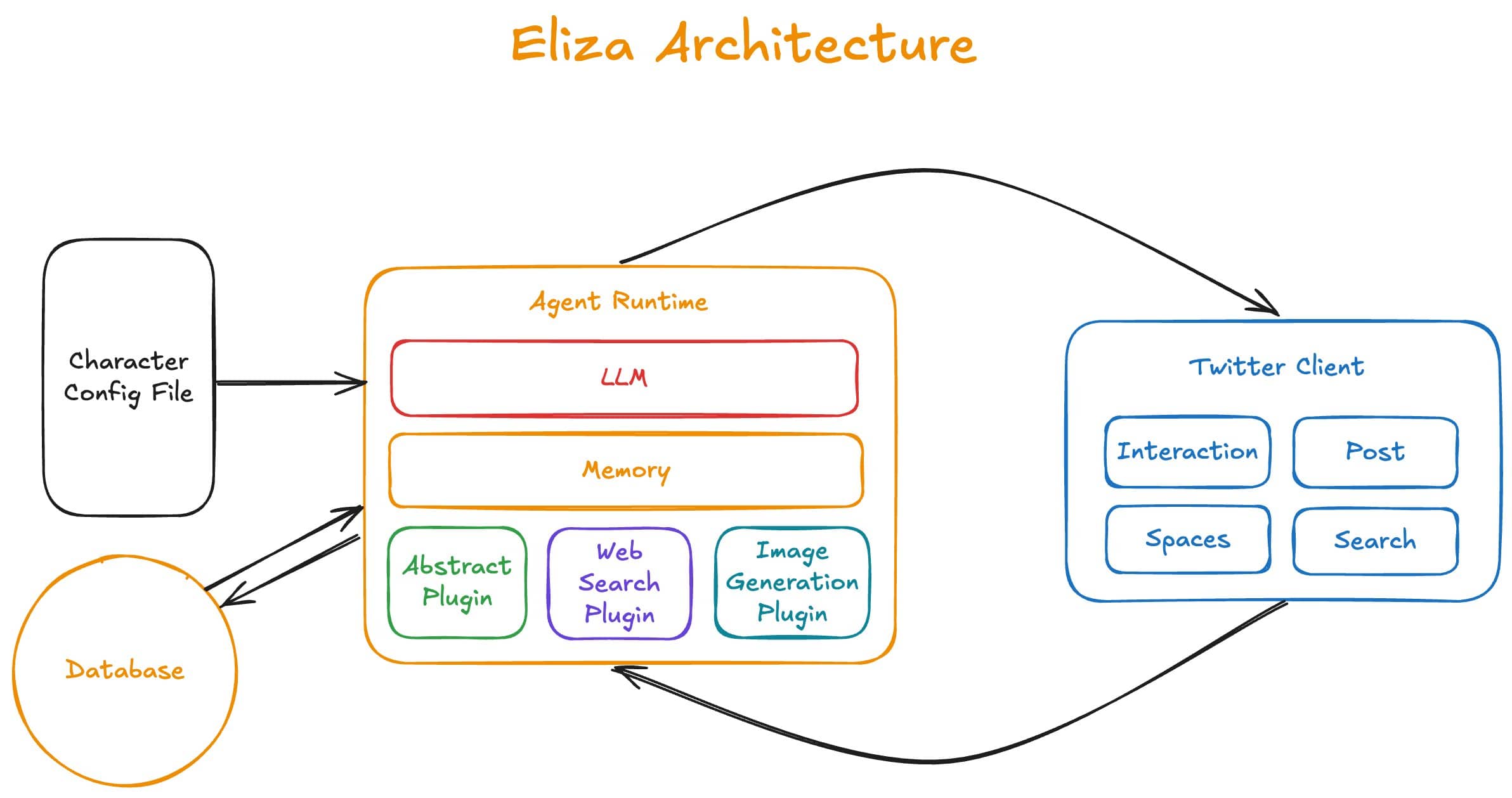🤖 Agent Runtime
The AgentRuntime is the core runtime environment for Eliza agents. It handles message processing, state management, plugin integration, and interaction with external services. You can think of it as the brains that provide the high-level orchestration layer for Eliza agents.

The runtime follows this general flow:
- Agent loads character config, plugins, and services
- Processes knowledge sources (e.g., documents, directories)
- Receives a message, composes the state
- Processes actions and then evaluates
- Retrieves relevant knowledge fragments using RAG
- Generates and executes responses, then evaluates
- Updates memory and state
Overview
The AgentRuntime class is the primary implementation of the IAgentRuntime interface, which manages the agent's core functions, including:
| Component | Description | API Reference | Related Files |
|---|---|---|---|
| Clients | Supports multiple communication platforms for seamless interaction. | Clients API | clients.ts, Discord, Telegram, Twitter, Farcaster, Lens, Slack, Auto, GitHub |
| State | Maintains context for coherent cross-platform interactions, updates dynamically. Also tracks goals, knowledge, and recent interactions | State API | state.ts |
| Plugins | Dynamic extensions of agent functionalities using custom actions, evaluators, providers, and adapters | Plugins API | plugins.ts, actions, evaluators, providers |
| Services | Connects with external services for IMAGE_DESCRIPTION, TRANSCRIPTION, TEXT_GENERATION, SPEECH_GENERATION, VIDEO, PDF, BROWSER, WEB_SEARCH, EMAIL_AUTOMATION, and more | Services API | services.ts |
| Memory Systems | Creates, retrieves, and embeds memories and manages conversation history. | Memory API | memory.ts |
| Database Adapters | Persistent storage and retrieval for memories and knowledge | databaseAdapter | MongoDB, PostgreSQL, SQLite, Supabase, PGLite, Qdrant, SQL.js |
| Cache Management | Provides flexible storage and retrieval via various caching methods. | Cache API | cache.ts |
Advanced: IAgentRuntime Interface
interface IAgentRuntime {
// Core identification
agentId: UUID;
token: string;
serverUrl: string;
// Configuration
character: Character; // Personality and behavior settings
modelProvider: ModelProviderName; // AI model to use
imageModelProvider: ModelProviderName;
imageVisionModelProvider: ModelProviderName;
// Components
plugins: Plugin[]; // Additional capabilities
clients: Record<string, Client>; // Platform connections
providers: Provider[]; // Real-time data sources
actions: Action[]; // Available behaviors
evaluators: Evaluator[]; // Analysis & learning
// Memory Management
messageManager: IMemoryManager; // Conversation history
descriptionManager: IMemoryManager;
documentsManager: IMemoryManager; // Large documents
knowledgeManager: IMemoryManager; // Search & retrieval
ragKnowledgeManager: IRAGKnowledgeManager; // RAG integration
loreManager: IMemoryManager; // Character background
// Storage & Caching
databaseAdapter: IDatabaseAdapter; // Data persistence
cacheManager: ICacheManager; // Performance optimization
// Services
services: Map<ServiceType, Service>; // External integrations
// Networking
fetch: (url: string, options: any) => Promise<Response>;
}
Source: /api/interfaces/IAgentRuntime/
Key Methods
initialize(): Sets up the agent's runtime environment, including services, plugins, and knowledge processing.processActions(): Executes actions based on message content and state.evaluate(): Assesses messages and state using registered evaluators.composeState(): Constructs the agent's state object for response generation.updateRecentMessageState(): Updates the state with recent messages and attachments.registerService(): Adds a service to the runtime.registerMemoryManager(): Registers a memory manager for specific types of memories.ensureRoomExists()/ensureUserExists(): Ensures the existence of rooms and users in the database.
WIP
Service System
Services provide specialized functionality with standardized interfaces that can be accessed cross-platform:
See Example
// Speech Generation
const speechService = runtime.getService<ISpeechService>(
ServiceType.SPEECH_GENERATION
);
const audioStream = await speechService.generate(runtime, text);
// PDF Processing
const pdfService = runtime.getService<IPdfService>(ServiceType.PDF);
const textContent = await pdfService.convertPdfToText(pdfBuffer);
State Management
The runtime maintains comprehensive state through the State interface:
interface State {
// Core identifiers
userId?: UUID;
agentId?: UUID;
roomId: UUID;
// Character information
bio: string;
lore: string;
messageDirections: string;
postDirections: string;
// Conversation context
actors: string;
actorsData?: Actor[];
recentMessages: string;
recentMessagesData: Memory[];
// Goals and knowledge
goals?: string;
goalsData?: Goal[];
knowledge?: string;
knowledgeData?: KnowledgeItem[];
ragKnowledgeData?: RAGKnowledgeItem[];
}
// State management methods
async function manageState() {
// Initial state composition
const state = await runtime.composeState(message, {
additionalContext: 'custom context',
});
// Update state with new messages
const updatedState = await runtime.updateRecentMessageState(state);
}
Plugin System
Plugins extend agent functionality through a modular interface. The runtime supports various types of plugins including clients, services, adapters, and more:
interface Plugin {
name: string;
description: string;
actions?: Action[]; // Custom behaviors
providers?: Provider[]; // Data providers
evaluators?: Evaluator[]; // Response assessment
services?: Service[]; // Background processes
clients?: Client[]; // Platform integrations
adapters?: Adapter[]; // Database/cache adapters
}
Plugins can be configured through characterfile settings:
{
"name": "MyAgent",
"plugins": ["@elizaos/plugin-solana", "@elizaos/plugin-twitter"]
}
For detailed information about plugin development and usage, see the ElizaOS Registry.
Running Multiple Agents
To run multiple agents:
pnpm start --characters="characters/agent1.json,characters/agent2.json"
Or use environment variables:
REMOTE_CHARACTER_URLS=https://example.com/characters.json
FAQ
What's the difference between an agent and a character?
A character defines personality and knowledge, while an agent provides the runtime environment and capabilities to bring that character to life.
How do I choose the right database adapter?
Choose based on your needs:
- MongoDB: For scalable, document-based storage
- PostgreSQL: For relational data with complex queries
- SQLite: For simple, file-based storage
- Qdrant: For vector search capabilities
How do I implement custom plugins?
Create a plugin that follows the plugin interface and register it with the runtime. See the plugin documentation for detailed examples.
Do agents share memory across platforms?
By default, agents maintain separate memory contexts for different platforms to avoid mixing conversations. Use the memory management system and database adapters to persist and retrieve state information.
How do I handle multiple authentication methods?
Use the character configuration to specify different authentication methods for different services. The runtime will handle the appropriate authentication flow.
How do I manage environment variables?
Use a combination of:
.envfiles for local development- Character-specific settings for per-agent configuration
- Environment variables for production deployment
Can agents communicate with each other?
Yes, through the message system and shared memory spaces when configured appropriately.